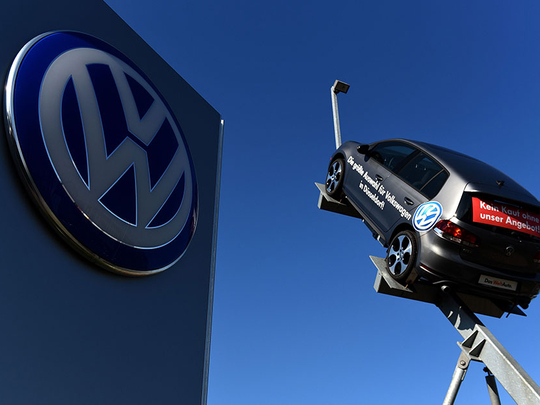
Frankfurt Am Main: The first major German court case against Volkswagen over the "dieselgate" scandal that has shaken up the car industry gets under way Monday, as investors pursue the world's largest automaker for billions in compensation.
From 10am (0800 GMT) the regional court in Brunswick will examine whether the auto giant should have informed investors sooner about so-called "defeat devices" it built into 11 million cars worldwide to fool regulatory emissions tests.
On the first day, "we are hoping for first indications from the judges about their view of the facts and the legal position," said Andreas Tilp, a lawyer representing investment fund Deka.
As the first major German court case against Volkswagen over the 'dieselgate' scandal gets under way #AFPgraphics looks at the key points pic.twitter.com/W9nI9Wq2sU
— AFP news agency (@AFP) September 10, 2018
The shareholder's "model case" against VW is supposed to clear up more than 200 questions common to some 3,650 claims totalling around 9 billion euros (Dh38 billion), with judges expected Monday to highlight timelines and priority issues in the massive case.
At issue is a 40-per cent plunge in Volkswagen stock over two days in September 2015, which wiped billions off its market value.
After markets closed on Friday, September 18 that year, US authorities accused the group of using the defeat devices - engine software designed to cut harmful emissions during regulatory tests, only to allow them to rise again during on-road driving.
Investors say they could have avoided painful losses had executives - who are legally obliged to share promptly any information that could affect the share price - informed them sooner of the cheating.
Ahead of Monday's hearing, Volkswagen lawyer Markus Pfueller said the group was "confident" that it had "complied with its disclosure obligations toward shareholders and the capital markets".
So far, dieselgate has cost VW more than 27 billion euros in fines, vehicle buybacks and recalls and legal costs, mostly in the US.
'Every nut and bolt'
Judges are expected to take at least until next year to rule.
Backed by government tax incentives, German and other European carmakers bet big on diesel in the 1990s and 2000s as a lower-carbon alternative to petrol engines.
But the "dieselgate" scandal has revealed the flipside of the technology, nitrogen oxides (NOx) emissions that can be harmful to health.
Investigations into Volkswagen and other manufacturers are dragging on.
Another investor probe starting Wednesday, against Porsche SE, the holding company with a controlling stake in VW, could be stalled or superseded by the Brunswick case.
Rupert Stadler, CEO of VW subsidiary Audi, is in custody on suspicion of fraud and issuing false certificates, and VW-owned Porsche, Mercedes-Benz manufacturer Daimler and components supplier Bosch are in prosecutors' sights.
Here are six things to know about the trial.
What is the case about ?
The case in Brunswick, near VW's Wolfsburg headquarters in northern Germany, focuses on the plunge in the mammoth group's share price in September 2015.
After American authorities revealed its mass diesel cheating, the stock shed some 40 per cent in two days.
Now investors are demanding compensation for their losses, saying Volkswagen should have warned them sooner about the risks.
Why should we care?
This is the first major trial related to "dieselgate" in Germany, where previously only a few individual customers have brought the carmaker to court and the results have not been made public.
In the US, VW settled claims with customers for some $14.7 billion, and two former managers were jailed.
While Monday's case deals with the technical aspects of how and when the group communicated with financial markets, the court will have to lay out a timeline of the scandal and determine when executives knew about the cheating.
Such details are vital to ongoing criminal investigations in Germany.
What must the court decide?
Brunswick judges will rule on more than 200 questions submitted by the two sides in the case.
Among the most vital are whether VW should have let investors know about its cheating software, whether it deliberately covered up the information, and which board members knew what - and when.
The answers will then be carried over to more than 3,000 pending court cases from investors against VW and Porsche SE, the holding company that owns a controlling stake, to determine whether compensation should be paid out.
What are the risks for VW ?
In total, the shareholders represented in those over 3,000 cases are demanding 9 billion euros (Dh38 billion) in compensation.
But if judges rule against VW, it will be up to the courts to decide in each case how much is owed.
So far, the group has paid out more than 27 billion euros in fines, legal costs and buy-backs over dieselgate in Europe and the US.
What do the investors say?
Lawyers for investment fund Deka, whose case is a "model" for the others with similar characteristics, argue VW should have informed investors at several points between 2008 - the time of the cheat software's first deployment - and September 22 2015, when it first admitted to the fraud.
They argue that managers knew about the so-called "defeat device" and that that information would likely have an impact on the group's share price.
What's Volkswagen's defence?
The world's biggest carmaker says that information available at the time did not make communicating with shareholders legally necessary.
They argue that the cheating was a scheme by a small group of engineers acting without their superiors' knowledge or authorisation.
Once alerted by the US authorities, executives did not realise how serious the scandal would become, they add, believing it could be resolved amicably.












